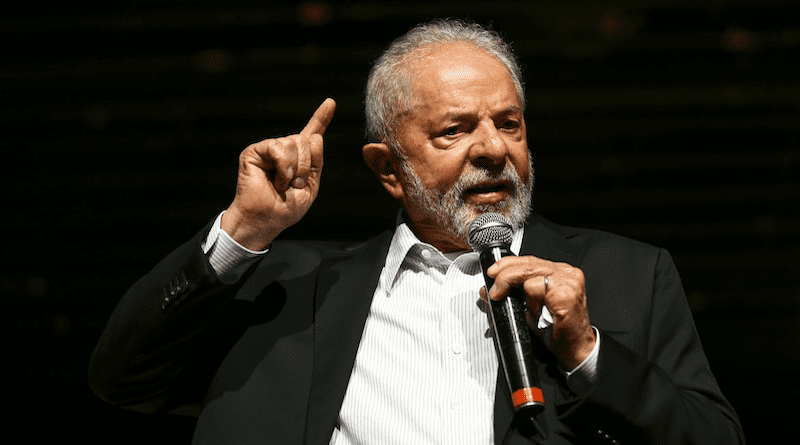Way More Than Hedging: Lula’s Brazil Is Gambling High – Analysis
By Observer Research Foundation
By Dawisson Belém Lopes and João Paulo Nicolini Gabriel*
Lula’s recent diplomatic trip to China and meeting with the Russian Foreign Minister, Sergei Lavrov, triggered prompt reactions from Western powers. Two facts made the news: Lula’s endorsement of an alternative currency to the dollar; and his statement that Washington and Brussels encourage the war in Ukraine. While the United States (US) sharply criticised Brazil for “parroting Russian and Chinese propaganda,” Brazilian agents managed to prevent possible skirmishes with European partners since attaining a trade agreement between Mercosur and the European Union (EU) is a long-lasting national diplomatic goal. Brazilian media outlets followed the Western reaction arguing that Lula blundered by arguably leaning toward Moscow and Beijing, despite claiming to assume a non-aligned stance.
Analysts often employ concepts such as ‘hedging’ or ‘balancing’ to explain the diplomacy of Lula’s administration. These expressions are meant to illustrate a sort of pragmatism in which Brazil cautiously works to get concessions from both sides by signalling it could endorse the pole that offers more benefits. We take this view with a pinch of salt because it seems not to fully capture the meaning of Lula’s strategy for international relations. By claiming that Brazil relies on a principle of nonalignment to take advantage of geopolitical disputes, those analyses assume the South American country to be a middle power that balances between great powers to prevent quarrels and obtain residual gains. Instead, we see Lula’s strategy as a very consequential drive to morph Brazil into a rule-maker in the global arena.
Elaborating further, Lula’s motto, “Brazil is back”, was promptly interpreted as Brazil’s proneness to abide by international norms to regain reputational assets lost during the Bolsonaro years. Unlike this thinking, Lula’s idea of bringing Brazil back to the global scene means making this state aspire again to the position of a rule-maker. During his two previous presidential terms (2003-2011), Lula happened to coordinate an active foreign policy aimed at contesting the world’s order regulating mechanisms—such as reforming the United Nations Security Council, advocating for the G20 forum in economic negotiations instead of the G7, and strengthening ties with other BRICS countries.
Therefore, the current Brazilian foreign policy reaffirms a thorny ambition of a Global South emerging power in the Western-led liberal order, i.e., to reject the social position of a traditional middle power that behaves like a rule-taker. When Washington and Brussels argue that they are upset because Brasília refused to sign on to the declaration of Biden’s Summit for Democracy that condemned Russia and negotiated with Chinese high-tech companies to provide 5G services, Western countries make it explicit the historical process of hegemonic sustaining around its values and normative understandings. A world order is not imposed only by force; hegemonic agents may also have to convince other agents that their interests and ideas work in favour of the common good to neutralise their speech.
It is not by chance that Western powers systematically condemned the non-alignment as a softer way of getting closer to the opposite pole. For instance, the White House has frequently questioned India’s non-alignment as a kind of tacit tilt towards Moscow—mainly during the Cold War. Western biases did not permit the understanding that Indian policymakers historically share an awareness of their country representing a great power that does not need to follow the lead of another state. Likewise, Western powers usually delegitimised the Global South’s attempts to provide solutions for global issues by labelling them “naïve”—like the Brazilian initiative to negotiate a trilateral nuclear agreement with Türkiye and Iran in 2010. This lexicon was again mobilised when Lula proposed a “Club of Peace” to negotiate a ceasefire between Russia and Ukraine while refusing to apply unilateral sanctions and warlike means.
When Brazilian media outlets pressurised the Lula administration to follow Western positions because they embody the “civilised” world, it is as if they reproduced social dynamics that reduced the possibility of Brazil playing the envisaged role of a great power. The authors are not claiming that Lula has to adopt a hostile policy towards the Western hemisphere. Yet, Lula revamped Brazilian ambitions to be a norm entrepreneur that provides international solutions without resorting to military-led ways. In this sense, Lula’s initiative to bring structural reform to financial institutions, or to propose a third way to solve the Russian-Ukrainian conflict, is not exactly a ‘hedge policy’ aimed at blackmailing Western powers to provide more gains in exchange for support. It is a geopolitical move by a country that genuinely aspires to climb the global status ladder.
*About the authors:
- Dawisson Belém Lopes is a professor of international politics at the Federal University of Minas Gerais (UFMG), a researcher of the National Council for Technological and Scientific Development in Brazil, and a senior scholar at the Brazilian Center for International Relations.
- João Paulo Nicolini Gabriel is a PhD candidate in Political Science at the Catholic University of Louvain in Belgium.
Source: This article was published by Observer Research Foundation

